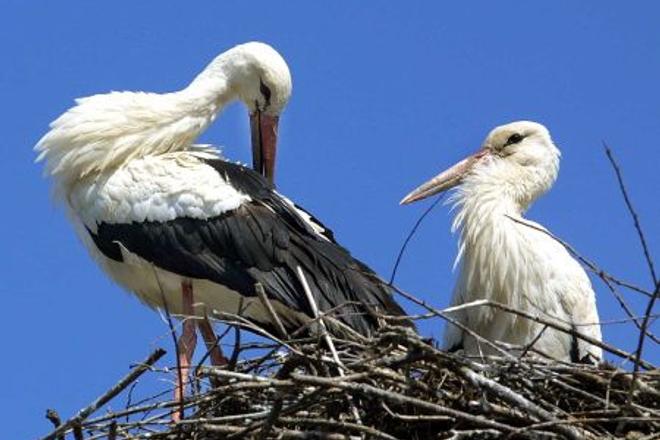ENVIRONMENTALISTS helped by fire fighters and a large crane successful moved a family of storks nesting on a chimney of a family villa in Poprad-Veľká to a man-made construction mounted on a concrete pillar. The storks liked their old nest on the chimney of the villa so much that even after environmentalists from the Tatras National Park (TANAP) made a new nest for them this spring, they returned to their original nest on the chimney.
“We waited until the young storks incubated, grew a bit, and then moved them to the new nest,” Pavol Majko, the head of TANAP told the SITA newswire on June 20. He personally took three stork nestlings, about five to six weeks old, from their original nest and asked ornithologist Miroslav Fulín to give them plastic and aluminium rings on their legs which contain identification data and contacts to Slovak ornithologists. Even if the young birds stray to another country, foreign ornithologists will be able to identify where and how they spend this coming winter. “They got a sort of birth certificate today – for their whole life, I hope, and I believe they will keep it as long as possible,” Fulín told SITA.
The timing of the relocation was crucial because if the ornithologists had waited just a few days longer the young storks might have tried to fly away, with a possibly unhappy ending. “I am optimistic. I believe that the parental instinct will force the parents to follow their nestlings, take care of them, and accept them – even in the new home,” Fulín said after the relocation.
It turned out that the ornithologist was correct as mother and father storks flew to the nest around noon that day and it seemed as if the family had adapted to the new nest. “We had put an artificial restraint in the old nest, a wooden pyramid, but in spring this did not prevent the storks from returning to the old nest – so we will try to remove the old nest as soon as possible, within a few weeks,” Majko said. “We want them to get used to their new home.”
Majko added that this was the first time that staff from TANAP had solved a problem like this.



 Storks (source: Sme – Ján Krošlák)
Storks (source: Sme – Ján Krošlák)